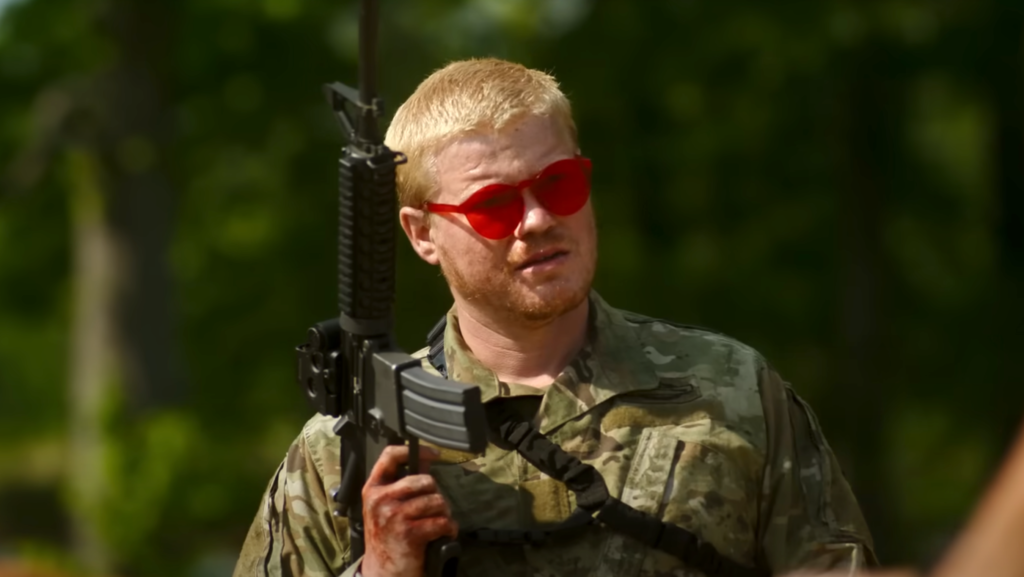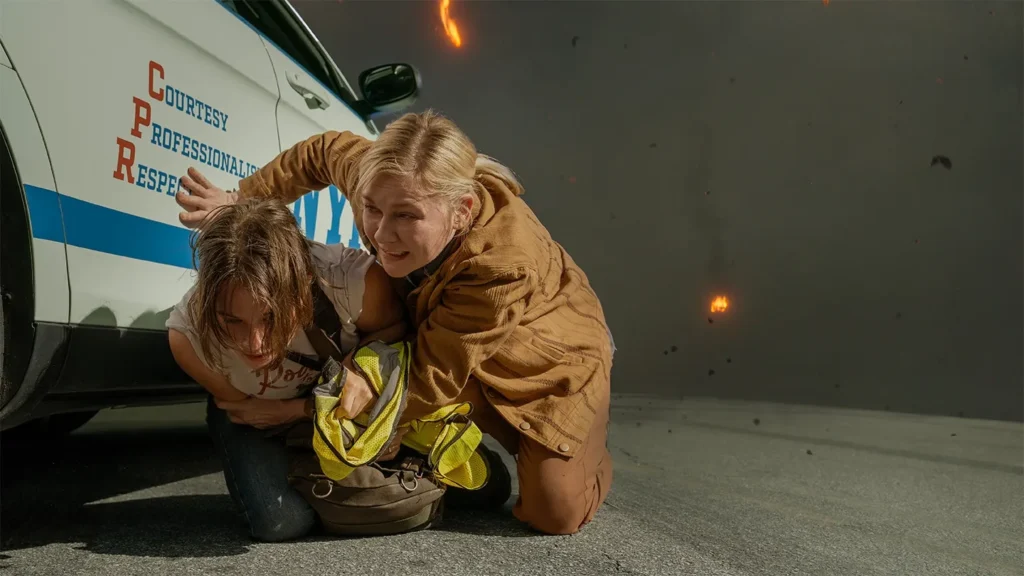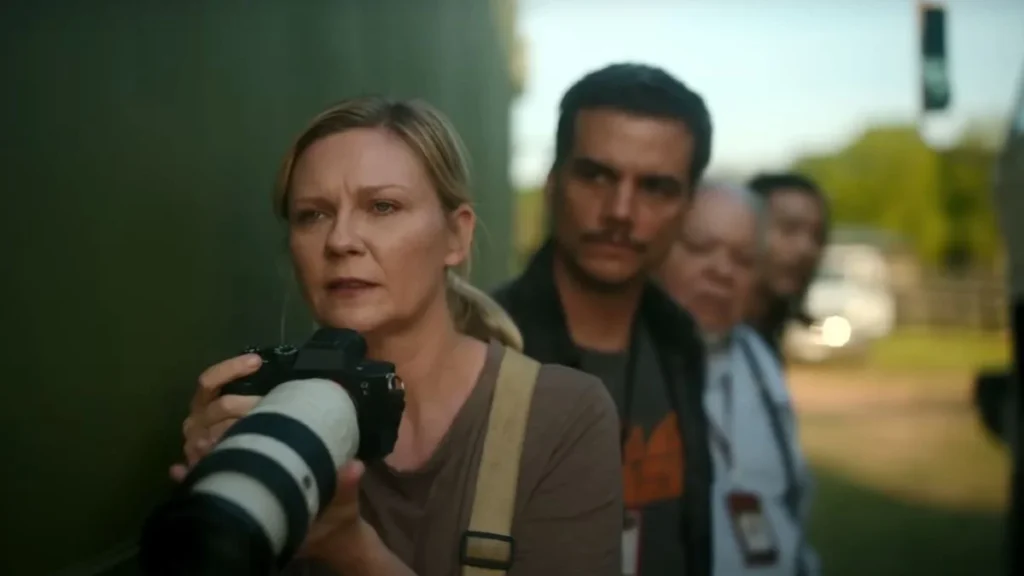“Heard of a van that’s loaded with weapons
Packed up and ready to go
Heard of some gravesites, out by the highway
A place where nobody knows
The sound of gunfire, off in the distance
I’m getting used to it now”
“What kind of American are you?”
I didn’t think “Civil War” would affect me the way it did. I’ve read some opinions on this film that seem to find it vacuous because it does not fully flesh out the reasons for the conflict (i.e., align with their personal political views) or that we’re not supposed to sympathize with the journalists because they care more about the Big Story than the fact that the world as they know it is falling apart. Seems to me, that’s kind of the point.
Civil War and Patton
Like Patton, Civil War is not about fighting a war. Instead, it’s about seeing the war. More importantly, it’s about us, as humans, seeing each other. It’s about how, no matter how self-serving, journalists document how things go down. Spin may be applied later, but photos tell the story, and there is no substitute for directly experiencing events that shape our times.
Social Commentary and Agenda-Free Storytelling

There’s a distinct tinge of social commentary in this picture. There is a reference to an ANTIFA massacre and a town that tries to distance itself from the horrors of war just miles outside its borders.
But these aren’t “left” or “right” agendas. This is a portrait of what America is like. In our fractured and divisive state, there are those compelled to join in, those who wait it out, those who pretend like nothing is wrong, and those who observe and report.
Standing By Ideals Amid Chaos
When times make it difficult to stand by an ideal, that’s when ideals are most important to stand by—even if the ideal is journalistic integrity and remaining dispassionate to report objectively.
The Role of Journalistic Integrity in Modern America

We have a problem in America, and part of that problem is journalistic integrity. Whether due to corporate interests preferring pro-Capitalist messaging, editors trying to maximize clicks and views, a general erosion of methodology, or a mix of all the above, it’s not an easy question to answer.
Why Civil War Matters

What is easy to answer is that Civil War is artistic, important, and emotionally impactful. Certainly, Nick Offerman’s president is shaped more by what others say or think about him than by what we see onscreen. He’s not onscreen for more than a few minutes, but that’s not the point.
The point is that we, as outsiders—whether military, journalists, or the general public—only know what is on our screens. In that way, he’s an analog for the Cult of Personality surrounding figures like Trump, Bush, and even Obama and Clinton, all of whom enjoyed a populist position, regardless of political leaning.
America’s Divisive Landscape and Civil Conflict

In Civil War, it doesn’t matter who shot first, whose policies failed, or what groups fractured when. There are so many disparate groups in America, each pursuing disparate goals. If there were a war tomorrow, there are segments of the LGBTQ+ community who would turn on trans members, just as some might serve their own interests in the face of things.
Those splinters would all be at odds with hard-line Christians who have bought into the idea that trans and gay people are “groomers,” which would conflict with the interests of the Hispanic community—split among those who came to the U.S. “the right way” versus those who might accept relatives who came here illegally being deported. And White Nationalists would likely take up arms against all the above groups.
The fact of the matter is, a civil war in America would be bloody, protracted, brutal, and devastating.
Journalism’s Role in a Fractured Society

The role of the journalist, should this happen, should remain the same. Journalists in general, even today, stand by the truism of not getting involved with either side but simply telling the stories. Kirsten Dunst’s character, Lee, learns that when you violate this principle, you pay a steep price. I’ll not divulge the details here.
I will say this: many who spoke against Civil War incorrectly labeled it as “woke” and claimed it doesn’t seek to answer the questions it raises.
Art and the Absence of Solutions
Art does not require answers or solutions to the problems it comments on. And to be clear, Civil War didn’t seem to me to comment on “left” or “right” issues. Instead, it challenges the viewer to look inside and truly question if similar events could come to pass. The events of January 6, 2021, showed us that some Americans are ready to go there. But the most potent sequence in Civil War comes around the midpoint: the journalists drive across an open field and come to a spot with a dead soldier in the road at the driveway to a house.
They are shot at, take cover, and encounter a sniper and a spotter. The snipers mention that they don’t know whose side the person shooting at them is on. They only know someone in that house is trying to kill them, and they are trying to kill that person.
A Reflection of Today’s Divisive Discourse
This isn’t just the nature of war; it’s the nature of current political discourse (or any discourse on social media, for that matter).
People see any disagreement as a fundamental or existential threat. It’s impossible to provide alternate points of view without facing vitriolic pushback. This movie says we need to stop acting this way towards one another and see each other as Americans.
A Call for Decency and Unity
But more than that, we need to treat people, regardless of where they’re from, with decency and respect. We must face things with positivity and reject negativity, hate, and harm. We are all humans, and we are all in this together. Don’t let them—the elites, the corporatists, those who protect the status quo—divide us.

Chaitanya Tuteja is someone who enjoys sharing his thoughts on books, movies, and shows. Based in India, he appreciates exploring different stories and offering honest reflections. When not reflecting on his favorite media, Chaitanya enjoys discovering new ideas and embracing life’s simple moments.


На данном сайте можно найти последние новости Краснодара.
Здесь размещены главные новости города, репортажи и важные обновления.
Следите за городских новостей и читайте только проверенные данные.
Если вам интересно, что происходит в Краснодаре, читайте наш сайт регулярно!
https://rftimes.ru/